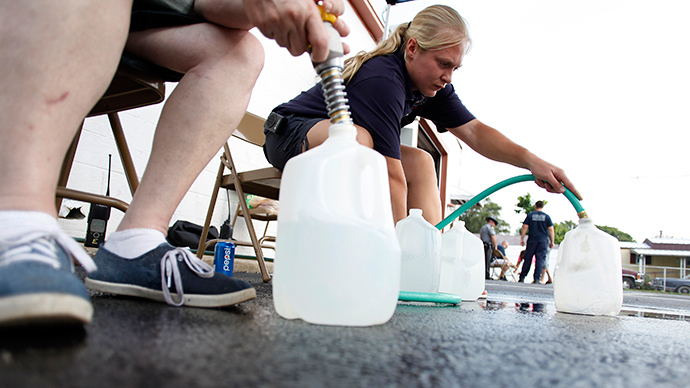Tapped out: Baltimore threatens water cuts to 25,000 customers over unpaid bills

Seemingly following in the footsteps of Detroit, Baltimore city administrators have given customers 10 days to pay their overdue water bills or face loss of water service. Residents and commercial tenants owe the city $40 million in unpaid bills.
Baltimore officials are trying to cut back on the problem of accounts going unpaid for months or even years. The Baltimore Sun estimates that a third of the bills due (about $15 million) are owed by 370 commercial tenants. Government offices and nonprofits owe close to $10 million.
READ MORE: Thirsty for justice: Detroit protesters flood streets over water shutdown
"We want to make sure all of our citizens pay their fair
share," Rudy Chow, director of Baltimore’s Public Works,
told the Sun. "When we don't collect the necessary revenues,
it causes us to raise water rates as a result. The citizens who
are paying their bills are, in effect, subsidizing those who are
not paying."
RT @Manuel_Rapalo: Baltimore poised to shut off water to nearly 25,000 households starting Wednesday.
— atmosphere (@atmosphere) April 6, 2015
The city is seeking payment from those who owe more than $250 or more, dating back at least half a year. Water rates have increased over the past three years by a total of 42 percent, with another 11 percent increase due to take effect this July, according Baltimore Brew.
The problem of non-payment is also not entirely the fault of customers unable or unwilling to pay. The Baltimore Sun found out the city’s Department of Public Works had chronic problems with billing, which included sending customers inflated statements. The department halted billing to improve accuracy, but this action caused further delays.
Raven Rakia @aintacrow 3h3 hours ago Baltimore plans to shut off water on thousands of low-income residents next... http://t.co/zhTtltetqo
— kathryn strzelecki (@kjrs56) April 4, 2015
Public Works made the water cut-off announcement on March 25, with little notice and no public hearings on the matter. Just under a week later, on March 31, several dozen protesters rallied outside City Hall to call on officials to reverse their decision. They want the City Council to investigate why customers are late paying.
“We’re in a state of shock and outrage,” Sharon Black, who helped organize the protest, told the Sun. “People aren’t paying their water bills because they can’t afford to.”
Baltimore City Council President Bernard C. ‘Jack’ Young said the city offers help to seniors and others in financial difficulties, but added the action is necessary to head off “future water rate increases.”
READ MORE: California staves off water crisis with $1bn emergency drought relief
A Food and Water Watch researcher, Mary Grant, told Think Progress the payment plans are too small to make a difference.
“There is low-income assistance, but it’s only a one-time payment of $161,” said Grant.
Matt Hill, an attorney for the Public Justice Center, called the threatened shutoff “inequitable and unconscionable,” and is concerned tenants will go without water because landlords don’t pay their bills.
Of the more than 600,000 residents in Baltimore, Maryland, 63 percent are black and 31 percent are white, according to US Census figures from 2009-2013. Twenty-four percent live below the federal poverty level.
READ MORE: Cutting off water to Detroit's poor 'an affront to human rights,' says UN
Last year, Detroit residents fought a similar decision by city administrators who threatened to cut off water to customers with overdue bills. The decision sparked criticism from around the country and the world, with some United Nations experts saying denying water to people could be a violation of human rights. Almost 40 percent of Detroit’s population lives below the poverty line, according to the AP.












